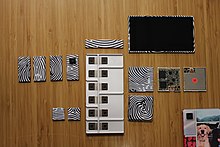
Back مشروع أرا Arabic Project Ara Czech Project Ara German Proyecto Ara Spanish Projet Ara French Project Ara ID Project Ara Japanese 프로젝트 아라 Korean Project Ara Malay Project Ara NB
 | |
 Ara smartphones with individual modules separated | |
| Also known as | Ara |
|---|---|
| Developer | Google (formerly with Motorola Mobility through the Advanced Technology and Projects group)[1] |
| Manufacturer | Google (individual modules and smartphone) |
| Product family | Yes |
| Type | Modular smartphone |
| Release date | Cancelled[2] |
| Operating system | Android |
| Website | Official website |
Project Ara was a modular smartphone project under development by Google. The project was originally headed by the Advanced Technology and Projects team within Motorola Mobility while it was a Google subsidiary. Google retained the ATAP group when selling Motorola Mobility to Lenovo, and it was placed under the stewardship of the Android development staff; Ara was later split off as an independent operation.[1][3] Google stated that Project Ara was being designed to be utilized by "6 billion people": 1 billion current smartphone users, and 5 billion feature phone users.[4][5]
Under its original design, as envisioned by NewDealDesign, under the leadership of Gadi Amit, Project Ara was intended to consist of hardware modules providing common smartphone parts, such as processors, displays, batteries, and cameras, as well as modules providing more specialized components, and "frames" that these modules were to be attached to. This design would allow a device to be upgraded over time with new capabilities and upgraded without requiring the purchase of an entire new device, providing a longer lifecycle for the device and potentially reducing electronic waste.[6][7] However, by 2016, the concept had been revised, resulting in a base phone with non-upgradable core components, and modules providing supplemental features.
Google planned to launch a new developer version of Ara in the fourth quarter of 2016, with a target bill of materials cost of $50 for a basic phone, leading into a planned consumer launch in 2017. However, on September 2, 2016, Reuters reported that two non-disclosed sources leaked that Alphabet's manufacture of frames had been canceled, with possible future licensing to third parties.[8][9] Later that day, Google confirmed that Project Ara had been shelved.[10]
- ^ a b Nilay Patel (29 January 2014). "Google to keep Motorola Mobility's Advanced Technology group, including Project Ara modular phone". The Verge. Vox Media. Retrieved 30 January 2014.
- ^ Sam Byford (1 September 2016). "Google reportedly cancels Project Ara modular smartphone plans". The Verge. Vox Media. Reuters. Retrieved 24 January 2017.
- ^ Pierce, David. "Project Ara Lives: Google's Modular Phone Is Ready for You Now". Wired. Retrieved 20 May 2016.
- ^ Russon, Mary-Ann (3 March 2014). "Could Google's $50 Project Ara 3D-Printed Device Change the Smartphone Market Forever?". International Business Times. Retrieved 4 March 2014.
- ^ Dieter Bohn (April 15, 2014). "Building blocks: how Project Ara is reinventing the smartphone". The Verge. Vox Media.
- ^ Byford, Sam (29 October 2013). "Motorola reveals ambitious plan to build modular smartphones". The Verge. Vox Media. Retrieved 29 October 2013.
- ^ Musil, Steven (29 October 2013). "Motorola unveils Project Ara for custom smartphones". CNET. CBS Interactive. Retrieved 29 October 2013.
- ^ "Google Reportedly Shelves Plans for Its Modular Smartphone". 2 September 2016.
- ^ "Exclusive: Google shelves plan for phone with interchangeable parts - sources". Reuters. 2 September 2016.
- ^ "Google confirms the end of its modular Project Ara smartphone". The Verge. Vox Media. September 2, 2016. Retrieved 2 September 2016.